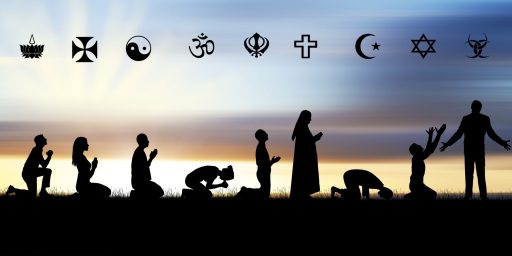FUNDAMENTALIST GOVERNMENT II
Apropos of our discussion yesterday, Alexandre of politiX links this Nicholas Kristoff column.
So here’s a fact appropriate for the day: Americans are three times as likely to believe in the Virgin Birth of Jesus (83 percent) as in evolution (28 percent).
So this day is an opportunity to look at perhaps the most fundamental divide between America and the rest of the industrialized world: faith. Religion remains central to American life, and is getting more so, in a way that is true of no other industrialized country, with the possible exception of South Korea.
Americans believe, 58 percent to 40 percent, that it is necessary to believe in God to be moral. In contrast, other developed countries overwhelmingly believe that it is not necessary. In France, only 13 percent agree with the U.S. view. (For details on the polls cited in this column, go to www.nytimes.com/kristofresponds.)
The faith in the Virgin Birth reflects the way American Christianity is becoming less intellectual and more mystical over time. The percentage of Americans who believe in the Virgin Birth actually rose five points in the latest poll.
<...>
Yet despite the lack of scientific or historical evidence, and despite the doubts of Biblical scholars, America is so pious that not only do 91 percent of Christians say they believe in the Virgin Birth, but so do an astonishing 47 percent of U.S. non-Christians.
I’m not denigrating anyone’s beliefs. And I don’t pretend to know why America is so much more infused with religious faith than the rest of the world. But I do think that we’re in the middle of another religious Great Awakening, and that while this may bring spiritual comfort to many, it will also mean a growing polarization within our society.
I would note that Pat Buchanan made a similar observation 11 years ago. As I recall, his comments were not well received.
While this divergence, both between Americans and “Old Europeans” and between religious and secularist Americans, exists it doesn’t change the argument. Indeed, it strengthens my position: the will of the American people is obviously shaped through the lens of their spirituality. My secularist viewpoint puts me in a decided minority and thus unlikely to get my way on many issues. I shouldn’t be required to participate in or finance the spiritual beliefs of the majority but this doesn’t mean that the minority should therefore prevail on all issues simply because their spirituality lends passion to their policy preferences.
Update (1434): Donald Sensing has a couple of interesting takes on this piece as well, coming from the perspective of a Methodist theologian: Kristoff–religious bigot? (lots of links) and the Virgin birth.






There’s one thing glaring omission from Kristof’s column, and that’s discussion of where Evangelical and conservative Christianity is getting much of its energy — namely, the growth of the Latino population. The realization of the vast, untapped social conservatism of Latinos is one of the reasons why the Buchananite fringe has been pushed out of the Republican Party. And good riddance.
When I go to Miami, I’m shocked at the number of Cubans, Panamanians, and other Hispanics I meet who have abandoned Catholicism in favor of Pentecostalism. Every liberal who ridicules John Ashcroft or Bush not for their policies but for their religious faith (and there are many who ridicule them for both) is inadvertedly making enemies with these people.
And with all due respect to Mr. Kristof, when he writes “The faith in the Virgin Birth reflects the way American Christianity is becoming less intellectual and more mystical over time,” I have to wonder if he knows a single Evangelical Christian or conservative Catholic.
Matthew,
Good points. I’m pretty sure Kristoff means all this in a sneering way. Still, belief in the Immaculate Conception is almost by definition mystical rather than intellectual.
James, his assertion that belief in the Virgin Birth is not intellectual requires us to accept that intellectual = rational. By that definition, C.S. Lewis and Kierkegaard weren’t Christian intellectuals, just philosophers. But given that leftist “intellectuals” peddle all sorts of irrational ideas (cough cough false consciousness cough), and nobody questions their intellectual status, it seems people want to pick and choose which intellectuals are allowed to be irrational and which ones are not.
Matthew, I think belief in things for which there is no evidence is by definition irrational. I don’t subscribe to false consciousness thinking but at least there is a logical argument advanced in favor of it. I don’t buy it, but it’s at least disputable.
James, my chief beef with Kristof and “mainline Protestants” is that their usage of “intellectual Christianity,” by which they mean “rational Christianity,” isn’t Christianity.
A Christian sect which teaches people that the Virgin Birth is fiction is also likely to teach that Christ as the Son of God is fiction (or only “symbolic”) and that Salvation is fiction, and so on and so forth. Christianity is by its nature an irrational creed, and I take pride in that fact. What Mr. Kristof is lamenting is, in truth, the decline of the “God is Dead” movement, which reduces Christianity to mere good manners.
This aside, I must disagree with you about whether false consciousness and aspects of existential Marxism are rationalist; poking through Hardt and Negri’s recent Neomarxist tract Empire is very much a journey into the religious foundations of the far left 🙂
Interesting discussion. The intellectual tradition of the church is fascinating, and I wish I knew more about it. As I understand it, Judaism, Islam, and Christian theologians all attempt to interpret contradictions within theological doctrine so as to present a consistent set of rules for everyday life. While their assumptions are taken on faith, they use a consistent methodology to arrive at their conclusions and spend a great deal of time focusing on how to effectively create institutions and mediate disputes. That’s why there’s a body of legal doctrine in the Catholic Church based on Roman principles.
The mystical approach to religiosity takes a different approach (no more or less rational than the other approach) focusing less on institutional rules and more on individual interpretations of mysterious and magical occurances.
Does this make sense?
This more recent online Harris Poll:
http://www.harrisinteractive.com/harris_poll/index.asp?PID=359
found that the number of non-Christians who believe in the Virgin Birth is now down to 27%, and that 77% of Americans overall believe in it. Of course, online polls are an even more inaccurate way of analyzing religious beliefs than other polls. I suppose that most of those 27% are lapsed Christians who still believe in much of the theology but can’t be bothered to put it into practice.
I don’t think he’s scoring any points by mentioning france. 🙂
It didn’t take any long for a bigoted comment to come out in one of these postings (Bryan’s anti-French jibe). This just confirms by belief that xenophobia lies beneath the surface of any fundamentalist movement.
Bombarded by a fearmongering media, the American people – the majority of whom live in the “safe zone” of the suburbs or in backwater rural areas – celebrate their sameness, attack all that is different (foreigners such as the French, urban areas which are seen as “hotbeds of sin,” etc.) and subscribe to a simplified worldview with clear distinctions between “good” (themselves) and “evil” (liberals, Muslim terrorists, atheists, etc.)
The people of France take pride in their secularism. The people of America should be ashamed that in the twenty-first century a majority of them prefer mystical creationism to scientific evolution.
It didn’t take any long for a bigoted comment to come out in one of these postings (Bryan’s anti-French jibe). This just confirms by belief that xenophobia lies beneath the surface of any fundamentalist movement.
Bombarded by a fearmongering media, the American people – the majority of whom live in the “safe zone” of the suburbs or in backwater rural areas – celebrate their sameness, attack all that is different (foreigners such as the French, urban areas which are seen as “hotbeds of sin,” etc.) and subscribe to a simplified worldview with clear distinctions between “good” (themselves) and “evil” (liberals, Muslim terrorists, atheists, etc.)
The people of France take pride in their secularism. The people of America should be ashamed that in the twenty-first century a majority of them prefer mystical creationism to scientific evolution.
It didn’t take any long for a bigoted comment to come out in one of these postings (Bryan’s anti-French jibe). This just confirms by belief that xenophobia lies beneath the surface of any fundamentalist movement.
Bombarded by a fearmongering media, the American people – the majority of whom live in the “safe zone” of the suburbs or in backwater rural areas – celebrate their sameness, attack all that is different (foreigners such as the French, urban areas which are seen as “hotbeds of sin,” etc.) and subscribe to a simplified worldview with clear distinctions between “good” (themselves) and “evil” (liberals, Muslim terrorists, atheists, etc.)
The people of France take pride in their secularism. The people of America should be ashamed that in the twenty-first century a majority of them prefer mystical creationism to scientific evolution.
It didn’t take any long for a bigoted comment to come out in one of these postings (Bryan’s anti-French ‘jibe’). Xenophobia lies beneath the surface of any form of fundamentalism, be it social, legal or religious.
Bombarded by a fearmongering media, the American people – the majority of whom live in the “safe zone” of the suburbs or in backwater rural areas – celebrate their sameness, attack all that is different (foreigners such as the French, urban areas which are seen as “hotbeds of sin,” etc.) and subscribe to a simplified worldview with clear distinctions between “good” (themselves) and “evil” (liberals, Muslim terrorists, atheists, etc.)
The people of France take pride in their secularism. The people of America should be ashamed that in the twenty-first century a majority of them prefer mystical creationism to scientific evolution.
—